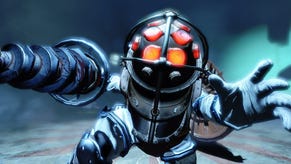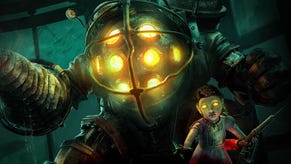Infinity and Beyond: Ken Levine on reinventing BioShock
BioShock Infinite's certainly got people talking, but all-too-often the conversation quickly jumps to: “What the hell is it?” We caught up with Ken Levine to find out.
In a world full of PR-regurgitating execs and phoned-in, dialed-down sequels, Irrational Games' Ken Levine is quite the anomaly. He could have ridden BioShock's tidal wave of success right back into Rapture for BioShock 2, but he instead chose to craft an entirely new world from the ground-up – literally.
Rising from Rapture's dilapidated depths, Levine's taken to the skies with BioShock Infinite's Columbia. And it's not just a simple change of scenery, either. Gone is Rapture's crushed Objectivist spirit, replaced by sunny early 1900s American idealism.
That, however, raises the question: why even call it “BioShock”? Why not embrace Infinite's originality and free it of the tremendous expectations that go hand-in-hand with the BioShock name?
“I think the fact that the physical location is different is not the only thing that defines a BioShock game,” Levine tells VG247 during a recent phone conversation. “I think there are plenty of other themes that define it that way.”
He adds: “It's a BioShock game, in the same way that a Call of Duty game is a Call of Duty game or a Zelda game is a Zelda game. What you're doing in terms of gameplay – it's centered around moving through this world that's incredibly detailed and realistic yet kind of fantastical.
"The fact that you have weapons in one hand and powers in the other hand and it's all about how you take on challenges with those powers that you have a good degree of control over – those things make it very much a BioShock game.”
This town ain't big enough for the two of us
On paper, then, Infinite's ties to the rest of the series are undeniable, but that's just the start. Dive deeper and you'll find the game's very DNA, which paradoxically owes everything to BioShock, and knocks down everything it worked so hard to build up. Nowhere is that more obvious than in Infinite's encounters, which – in some cases – take the “S” out of FPS altogether.
“I think what's interesting is that defining what a typical encounter is in BioShock Infinite is going to be very tough,” says Levine.
“When we started the BioShock franchise, one of the biggest challenges we had was when the player encountered the Big Daddy for the first time. The natural reaction of the testers was that they'd whip their gun out and start shooting it, because that's what you do. When you see somebody in a first-person shooter, you shoot 'em.
"We had to do a ton of work to train the player not to shoot the Big Daddy immediately. Like if you remember, it was four – maybe five – times before you were in a place where you could actually shoot him. We sort of did all this work to make the player understand that there were other ways to approach the problem.
“So we really tried to expand that thinking in BioShock Infinite to a broad range of AI – that there are AIs in the world that have different [behaviors]. Sometimes they're not going to fight you at all. Sometimes they're going to find you in the right conditions.
"The example we gave is that you come into a bar and there are all these guys, and you're not sure what's going to set them off. Maybe nothing will set them off unless you take your gun out and start shooting them. There's a whole range of activities that could set them off.
"It's sort of like, you know, in your personal life, you come home and sometimes you don't know what you're going to say to your significant other that may set them off [laughs]. Or they may say something to you.”
Confused? In most cases, that'd be an unfortunate indicator that Irrational ought to get its head out of the clouds and go back to the old drawing board. For Levine, however, that's mission accomplished.
“Some people have said to me, 'How do you know what's going to make them fight you?' And I'm like, 'Well that's the interesting thing. You don't.'"
“So some people have said to me, 'How do you know what's going to make them fight you?' And I'm like, 'Well that's part of the interesting thing. You don't.' You learn things along the way. There are certain tools you're going to have that are either going to turn enemies into friends or sometimes friends into enemies.
"But that whole messing with the AI space – you know, finding groups that are opposed to each other and being able to exploit those oppositions to your advantage – those are some of the really fun things that we started in BioShock, but we've moved it away from the Big Daddy space and into a much broader AI space,” he explains.
Booker and Elizabeth, sitting in a tree
Unlike BioShock, Infinite's definitely not a one-man show. In fact, based on what Levine tells us, Elizabeth might be even more important than you. And that's key, because she'll be responsible for saving your skin on multiple occasions. Here's the thing, though: it comes at a price.
“There are always moments where she offers opportunities for you, and you can take advantage of those opportunities, or you can just ignore them. In the actual game itself, it's basically she can offer up stuff almost everywhere. And it's really about you deciding what are these opportunities you're going to take, because she doesn't have an unlimited power set in terms of how much she can do for you. So you have to choose,” he says.
“It's going to be very, very interesting. I mean, she's a narrative driving force in the game, certainly. But she's also something that really expands [your options]. She's another arrow in your BioShock powers quiver. We're expanding that quiver substantially for the game itself in terms of the powers you have in your hands, but also Elizabeth adds a whole new spectrum to that,” he adds, using the rainstorm from the first gameplay demo as an example.
"When somebody makes a sacrifice for you, that's an incredibly bond-forming experience. That's the root of every powerful relationship.”
Granted, that's only half the equation. Why should you care about Elizabeth's currently non-specific plight if she's just a gun with soulless eyes and a doll-like face? Sadly, the gaming industry's not exactly known for its stable of subtle, convincing characters, but Levine's not the type to call it quits just because everyone else has already thrown down the Rubick's Cube in frustration.
“When we started with this companion character, we said, 'Well, it's easy to have Booker form an attachment with Elizabeth.' That's easy, right? I just write that. Booker says, 'You're awesome,' and Elizabeth goes 'You're awesome too!' That's the easy part.
"The hard part is how you make the player form an attachment. And what we did – we're going to be showing a lot more of the dynamics of their relationship in the next demo – is we said, 'OK, what makes people form attachments in life?' Especially very quickly, right? Because these people just met each other,” Levine says.
“If you go back to those relationships you've had in your life where you just meet somebody and the attachment grows quickly, there are several things to be thought about. One is that generally people thrown into a crucible together – into a dangerous, challenging, stressful situation – often form relationships more quickly. And the way they form them is they end up making sacrifices for each other. It's doing things together that cost them.
"When somebody makes a sacrifice for you, that's an incredibly bond-forming experience. That's the root of every powerful relationship.”
Simple enough, right? When your characters are in a first-person shooter, we don't think it's too much of a stretch to say they'll be in danger every once in a while. For instance, all the time. For Levine, though, it's a bit more complicated than that.
“I think one of the primary examples is people fall in love with their doctors,” he says. “Again, because they're in a dangerous, stressful situation and here's somebody who's really pulling out the stops for them.
"So Elizabeth and Booker quickly form this relationship based upon the fact that, well, they're not having a very good time [laughs]. They're probably having the worst time of their lives, and they're the only ones there for each other. They're the only ones that each one can turn to.
"So we look into our own lives and the problems we've had – the sickness we've had, the financial problems we've had – and the people that have been there for us and the things they've done for us. That's what we use for an inspiration in thinking about this relationship.”
A man chooses, a slave obeys
Infinite, then, is a game that's very much about the player's experience both inside and outside its confines – not some hypothetical “optimal” playthrough. Options abound, both in terms of how you play and how you interpret the subject matter.
And that's hugely important for Levine – especially in a videogame culture that otherwise hinges incredibly heavily on binary, this-or-that choices. Good versus evil, Xbox 360 versus PS3, Marvel vs Capcom versus a good fighting game – you name it. The mentality's everywhere. Levine, however, isn't a fan.
“I think that generally, our feeling is that most people feel trapped in between very, very polarized viewpoints and are really somewhere in the middle of that.
"You can get crushed by those viewpoints. Our personal feelings come more from that – of being somebody who doesn't wake up every morning knowing exactly what their political viewpoint is, exactly what their social viewpoint is, and going out and spending every ounce of energy making sure people get in line with that viewpoint. I think we're more about asking questions and providing answers,” he tells us.
“I think in terms of how we think about it, we have less of a Manichaean view of the universe. To me, the real world is a little more complex. There are some extremes, obviously. I mean, if you invoke Godwin's Law – bring up the Nazis – and you find these real extremes where it's kind of hard to find any positive viewpoint.
"But in general, I think that the world's a pretty murky place. If you really try to find white hats and black hats, it's very tough to find them in the real world. But I think we're attracted to them because it's simpler, and people like simplicity.”
Broad black and white strokes will only get you so far, however, and in case you hadn't guessed, Infinite's not really into the whole “limits” thing. At the end of the day, Levine and co are only hoping to give you a little nudge – not a harsh shove right off the deep end.
“I think if you played our other games – System Shock 2 and BioShock – we're not generally fans of saying, 'here's a definitive statement about the world and how it should be,'” Levine explains.
“With the first demo of Infinite, we had a lot of responses saying, 'oh, you're attacking this group. You're attacking that group.' They've not seen what else is going on in Columbia. We're into presenting a bunch of different viewpoints and saying, 'Here's the good, here's the bad. Why don't you sort it out?'"
“No multiplayer? Five out of ten.”
When the original BioShock first came out, the whole world did a collective, especially sticky spit-take. “No multiplayer?” it asked. “Madness! Sheer madness! It will flop and never have at least two sequels.” It did not flop. It has had at least two sequels.
Levine, then, doesn't look at multiplayer as an absolute necessity. If you've got an interesting idea, that's fine. But if you're tacking on multiplayer for another quick-and-dirty bullet point, then you're destined to fail.
“BioShock's a great example,” he says. “We sold 4.5 million units. To some degree, that was a victory of, 'Let's make the right product – not what a marketing survey tells us.'
"If we had a great multiplayer thing to say in that game, we would have made a multiplayer mode. We would have done it if we had something to say. But we just didn't, so I didn't want to do what I had done before. I didn't want to be forced to fill a checklist some marketing guy had about what a product should be.”
“Most people tend to ignore a multiplayer mode that isn't compelling. That's way more common than anything else. People work all this time to create a multiplayer mode, and you can go on Xbox Live and you literally see – even in some good multiplayer games – six, eight, or ten people playing the game. Literally. In the world. It's heartbreaking.
"If you're going to do that, it'd better not be because some marketing guy is telling you to do it. It'd better be because you have something to say.”
A moment of violence
There's no avoiding it. In the gaming industry, Ken Levine's “that guy.” The brainy one. He asks big questions. Gamers name-drop him in the same way movie-goers talk about how they “get” Chris Nolan films. Even so, we're still talking about games where – at the end of the day – you're shooting dudes in the face.
Before the advent of videogames, face-blasting and chin-stroking weren't generally considered compatible activities. Thus, the question arises: are we forcing two unlike puzzle pieces together and ruining both in the process? Typically an idealist, Levine takes a surprisingly realistic stance here.
"When you watch a TV show, people like looking at good-looking people. When you play a videogame, people like shooting stuff."
“There's a bit of suspended disbelief, right? You know, in BioShock 1, you're going around the world and you're exploring all this interesting stuff and answering all these moral questions. And you're also shooting dozens and dozens of people to death.
"We give a reason, you know, because they're coming after you, basically. But it is a little strange, right? No one can deny the suspension of disbelief you have,” he says.
“I feel this too when I'm watching a TV show. Some cop show or something. I'll be like 'wow, the cops in this city are very attractive!' It's ridiculous how good-looking all the victims and all the cops are. How photogenic they are. But when you watch a TV show, people like looking at good-looking people. When you play a videogame, people like shooting stuff quite often.”
There's no denying, though, that games are becoming more and more advanced. There's a difference between suspension of disbelief and outright denial. Levine's well aware of that, but when push comes to shove, he has precisely one goal: fun.
“If you look at, say, Heavy Rain, I think they try to explore different areas of the challenge space. You can argue that's more or less interesting as a challenge than shooting people. It's generally easier to get past the suspension of disbelief problem, but you also have the question, 'Is it as fun? Is that a fun challenge?'
"For whatever reason, the physical act of leading a target and shooting at it is an interesting, challenging fun dexterity problem,” he tells us.
“Games generally involve some interesting, fun challenges – whether it's dexterity or mental. Videogames that don't have that – more narrative fiction, like Swords and Sworcery on the iPad – there's not really a gameplay component to them.
"But Irrational is making games. I like games. I've always liked games. I've always played games. I've always liked games that have some kind of challenge component. So I think I'll continue to make games that have stories, but I really like the fact that games are games.”









